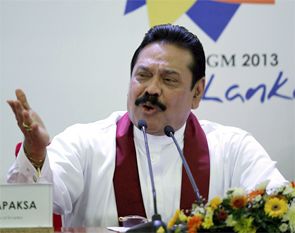 With some countries like Britain and Canada seeking to bring alleged human rights violations in the Sri Lankan civil war against the Liberation Tigers of Tamil Eelam under the scanner during the Commonwealth Heads of Government Meeting, President Mahinda Rajapaksa on Friday asked member nations not to turn the Commonwealth into a "punitive and judgmental" body and desist from introducing bilateral agendas.
With some countries like Britain and Canada seeking to bring alleged human rights violations in the Sri Lankan civil war against the Liberation Tigers of Tamil Eelam under the scanner during the Commonwealth Heads of Government Meeting, President Mahinda Rajapaksa on Friday asked member nations not to turn the Commonwealth into a "punitive and judgmental" body and desist from introducing bilateral agendas.
Welcoming heads of government and foreign ministers to the 22nd CHOGM summit, Rajapaksa made yet another combative speech on his country's success in the battle against "30 years of terror" and the “return of peace" in the island.
He appealed for a constructive engagement in the Commonwealth on issues like economic growth and eradication of poverty.
"Make the Commonwealth a truly unique organisation for engaging in collaborative unity rather than indulging in prescriptive and divisive ways," he said in his opening remarks to the summit of the 53-member grouping.
India is being represented by External Affairs Minister Salman Khurshid at the summit after Prime Minister Manmohan Singh called off his plans in the wake of stiff opposition from political parties in Tamil Nadu.
Khurshid and British Prime Minister David Cameron, who has planned a visit to the Northern Jaffna province, were present on the dais to hear him at the opening ceremony.
Deepak Obhrai, Parliamentary Secretary and representative of Canadian Prime Minister Stephen Harper and Arun Bullel, foreign minister of Mauritius, were also present.
Both Harper and Mauritius Prime Minister Navin Chandra Ramgoolam, who will be hosting the next summit, decided to boycott the summit citing the poor human rights record of Sri Lanka.
Prince Charles, deputising for his 87-year-old mother Queen Elizabeth II, and Australian Prime Minister Tony Abbott, the outgoing chair of the Commonwealth, were also present.
Thanking the Commonwealth countries for reposing confidence in his country to host the summit, Rajapaksa said this would greatly assist him in serving the country and taking it on the path of growth and development.
Asserting that his country has come to enjoy peace and stability after suffering from terrorism for the last 30 years, he said Sri Lanka has the greatest regard for human rights by standing by the right to life of the people.
"In the past four years, there has not been a single terrorist incident anywhere in Sri Lanka," he said to a round of applause from the gathered audience.
The president said the Commonwealth nations must collectively find ways of facing challenges and safeguarding values close to them.
"If the Commonwealth is to remain relevant, the member countries of the association must respond to the needs of its people by not converting the body into a punitive and judgmental body by introducing bilateral agendas in the body against the Commonwealth traditions," he said.
He quoted Lord Buddha's words, "Let us only be concerned about what one has done and not what has not been done in the past."
The president also said that the Commonwealth nations had the primary duty to lift their people above poverty.
"That is why we chose the theme of 'Growth With Equity and Inclusive Development, he said, adding the governments should prioritise the need to provide basic needs like health care, safe drinking water and eradication of poverty and hunger.
Without referring to the war against LTTE, Abbott said Sri Lanka had faced many challenges in recent years and the country had more freedom now.
"Justice today is better than yesterday, Justice tomorrow will be better than today," he said.
Prince Charles, in his inaugural speech, also said Sri Lanka has faced many challenges in the past including the 2004 tsunami that had destroyed many lives and displaced thousands of people.
Image: Sri Lanka's President Mahinda Rajapaksa speaks during a pre-CHOGM news conference in Colombo ' Photograph: Dinuka Liyanawatte/Reuters










